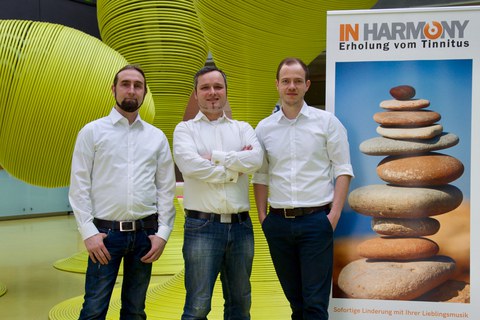May 17, 2019
TU foundation project offers software solution for tinnitus relief

The spin-off team "IN HARMONY" from left to right: Matthias Lippmann, Martin Spindler, Steven Mack
The interdisciplinary research group "IN HARMONY" has developed a prototype at the Chair of Human-Computer Interaction at the TU Dresden to offer patients with tonal tinnitus immediate tinnitus compensation. The three founders Martin Spindler, Matthias Lippmann and Steven Mack were involved in a research project from 2013, the idea of which was developed by the ENT physician Priv.-Doz. Dr. Gerd Tymnik from Großenhain, with the tinnitus disease and solutions for the relief of symptoms. Tinnitus is based on a disturbance of the hearing function in which the affected person perceives a permanent ear noise in the form of humming, whistling or hissing. Approximately 3.9% of the population have chronic subjective tinnitus; 270,000 new cases occur annually in Germany. The health effects of tinnitus sufferers can vary greatly depending on their severity. However, sleep disorders, anxiety, depression and inability to work are possible consequences of the disease. There is a multitude of therapies, from drug approaches to psychotherapy, which are intended to alleviate the symptoms; a cure for chronic tinnitus is only possible to a limited extent compared to acute tinnitus. Even if the ear noises do not disappear completely, a compensation is possible in which the patients no longer perceive the noises as emotionally stressful.
The TU spin-off of "IN HARMONY" will take place until mid-2019. The basic idea of the founding team is a tinnitus compensation with the help of a music application in everyday life. For this purpose, the individual tinnitus frequency of the patient is first limited by means of software. The selected piece of music is then automatically adapted: "We load a piece of music selected by the patient into our software for this purpose. Our algorithm technically analyzes the musical composition of the piece and adapts it to bring it into harmony with the tinnitus tone," explains Martin Spindler. The harmonic character and the natural quality of the piece of music are preserved and the tinnitus tone is embedded in the harmony so that it is no longer perceived as disturbing. First runs with test persons show that the tinnitus load is hardly noticed during application and that even after a 15-minute break the load is significantly lower than before the treatment. The positive feedback from the volunteers encouraged Martin Spindler to transfer the research project to a spin-off.
The music software can be used as often and as long as the user wishes. "Unfortunately, there is no pill for tinnitus yet. In coordination with the ENT physician in charge, the music software can be used as a supportive tool to reduce sleep or concentration disorders, for example. With our solution we can at least temporarily alleviate the tinnitus load", says Martin Spindler. The goal of the founding team is to bring a software medical product to market whose costs will be covered by health insurance companies in the future. However, the product must be medically approved. The next step is therefore a clinical study that is currently being started in cooperation with the University Hospital of Dresden. The project "IN HARMONY" is supported by the founding network dresden|exists and the professorship Human-Computer-Interaction under Prof. Dr. Gerhard Weber and supported with an EXIST-founder scholarship of the BMWi from 2017 until 2018. The Unit 5.3 Transfer Office also advises start-ups on all aspects of intellectual property rights. "In Harmony" is nominated for the Saxon Founder Award at futureSAX 2019.
Information for journalists:
Foundation project "IN HARMONY" Martin Spindler e-mail: info@in-harmony.land
phone: +49-351-4633846 https://www.in-harmony.land/
